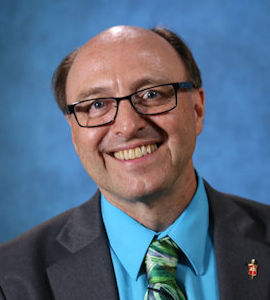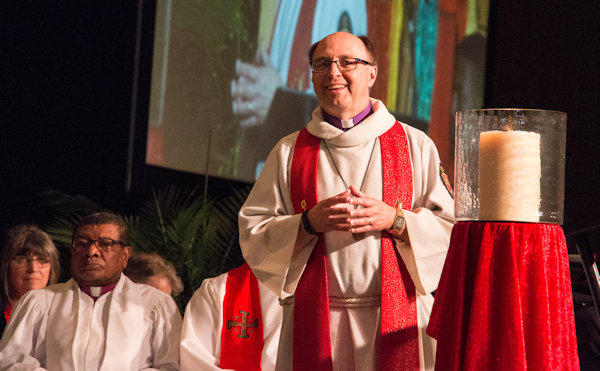In June’s edition of “A Joyful Journey,” Bishop David Bard reflects on church growth.
BISHOP DAVID A. BARD
Michigan Area
Let it grow, let it grow. Let it blossom, let it flow. ~ Eric Clapton
But speaking the truth in love, we must grow up in every way into him who is the head, into Christ. ~Ephesians 4:15
 This edition of my monthly blog is being published as we gathered in Traverse City for the meeting of the Detroit and West Michigan Annual Conferences. What seemed so far away when I became your bishop has arrived. Months of planning, praying and preparation have all come together.
This edition of my monthly blog is being published as we gathered in Traverse City for the meeting of the Detroit and West Michigan Annual Conferences. What seemed so far away when I became your bishop has arrived. Months of planning, praying and preparation have all come together.
Since moving to Michigan Julie and I have been asked many times about the weather, how it compares with Minnesota. Minnesota, like Michigan, is a big state, and the weather varies quite a bit. Julie and I both grew up in Duluth and were living there when I was elected a bishop. Duluth is in northern Minnesota, along the shores of Lake Superior. Its weather may be more akin to Marquette than Lansing, while Lansing may be more like Minneapolis. Anyway, we are grateful for a longer spring here. Duluth received some snow in early May while here the trees were budding and flowers opening. We are enjoying this extended season of growing and blooming.
As your bishop, I hope we might be entering an extended growing season for our United Methodist churches here in Michigan. By that, I may mean something different than, or at least something more than, you might at first imagine.
Typically when someone in the church writes about growth our minds tend toward numerical growth – in membership, worship attendance, giving, and other kinds of participation in church life. Certainly, this kind of growth is important to and for our churches. Vibrant churches are churches that are helping people grow in their participation and are welcoming new persons into their midst. Jesus commanded his followers to go and make disciples, and The Acts of the Apostles includes numerous references to how many people were being added to the fellowship of followers of Jesus.
While important, numerical growth is not the only kind of growth that matters. We should be intentional about seeking it while acknowledging that for some of our churches this may no longer be possible. I hope our growing season includes other kinds of growth, many of which will also help with numerical growth.
“I hope our growing season includes other kinds of growth, many of which will also help with numerical growth.”
A church consultant once wrote that most of our congregations suffer under the dual illusion that growth (by which she meant numerical growth) could occur without change and that change could occur without conflict. As we seek to grow we will need to change, and change is not often easy. This suggests another kind of essential growth, growth in being a mature community.
Mature communities are groups of people who have skills and resources to navigate change and conflict without doing damage to each other. They recognize the inevitability of conflict, for what is conflict but having a variety of ideas not all of which can be enacted simultaneously. Isn’t it good to have more ideas than one can act upon at any given time? Mature communities help people work with the differing ideas in their midst. They help people remember that each person in the community is a beloved person of God, a person of sacred worth. Growth in the congregation as a mature community is vital for numerical growth but is of value in and of itself. Our world needs more places where people know how to work together in the midst of differences. At baptism, we promise to surround persons with a community of love and forgiveness, a mature community.
“Our world needs more places where people know how to work together in the midst of differences.”
Growth as a mature community implies that we want to be churches that help people grow in love. Many of us can site the mission of the church – “to make disciples of Jesus Christ for the transformation of the world.” Fewer of us have given sufficient and sustained thought to what a disciple of Jesus Christ looks like. We are better at articulating some of the characteristic activities of disciples of Jesus Christ, things such as prayers, presence, gifts, service and witness than some of the more intangible qualities of disciples of Jesus Christ, and at the top of that list is love. By love, Jesus tells us, will people know that we are disciples. No matter how amazing our giftedness, without love it is nothing but noise without rhythm, spectacle without anything truly spectacular, Paul tells us.
At the recent gathering of Elders from West Michigan and Detroit, I said that if we memorized only one brief Scripture, I would suggest it be from Galatians 5, where the fruits of the Spirit are delineated: love, joy, peace, patience, kindness, generosity, faithfulness, gentleness and self-control. That’s what a disciple of Jesus looks like, and if we are not helping people grow in that way perhaps we are just church bells without melody, worship services full of sound and fury signifying nothing. I know that’s not what any of us wants to be.
May this time of budding and blooming and flowering also be a season of growth in the Spirit for us Michigan United Methodists.
Last Updated on November 7, 2023

